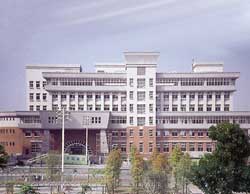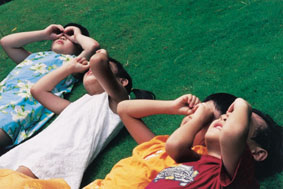 |
|||||||||||||||||||||||||
CYUT Facts |
|||||||||||||||||||||||||
| Administrative units | |||||||||||||||||||||||||
| The Office of Research and Development | |||||||||||||||||||||||||
| Poding Memorial Library | |||||||||||||||||||||||||
| Administration units | |||||||||||||||||||||||||
|
The
Office of Academic Affairs The Office of Academic Affairs performs a number of important administrative tasks, including classes, grades, admissions, and registration services. The office also prints most school-wide documents, such as the Journal of Chaoyang University. The Office has divided into three main sections:
The Office of Student Affairs handles a wide range of administrative functions relating to the University's students, including health, counseling, extra-curricular activities, dormitory living, and manual education. The Office is divided into several sections, listed below.
The Office of General Affairs is in charge of school-wide purchasing, construction, maintenance, property management, and clerical services. Following is a brief list of the main sections of the Office and their functions
The Office of Personnel handles a broad range of faculty and staff services, including hiring, wages, evaluation, insurance, retirement, leaves and travel, employee benefits, and administrative services for a variety of school-wide committees.
The Office of Accounting is responsible for school-wide financial policy and accounting service. |
|||||||||||||||||||||||||
| The Office of Research and Development | |||||||||||||||||||||||||
|
Brief History and Mission Statement The Research and Development Council was established in August, 1999, in order to help sustain the development of Chaoyang University of Technology. The Council was responsible for strategic planning of school development and making policies based on advice from the Research and Development Committee. The Council was renamed the Office of Research and Development in August, 2001. Chaoyang University of Technology is pursuing a vision to collectively transform into a superior-quality, medium-sized, technology university, geared towards succeeding in the future. The school promotes the special features of all its departments and strives to obtain abundant funding from different sources. To overcome these challenges, the Office of Research and Development was reorganized and separated into several divisions in August, 2003.
The primary missions include: the planning and evaluation of university development; the enhancement of academic research; the facilitation of international academy exchange; the assistance of industrial cooperation and alumni services; and the incubation of innovative techniques. It is hoped the reorganization will allow the Office to better support all academic units in the creation of special features which may substantially improve the standing of the university.
Organization and Administrative Affairs To implement the preceding, specific missions, the Office is composed of four Divisions and one Center: 1) The Division of Planning and Evaluation; 2) The Division of Research and Development; 3) The Division of Academic Exchange and Cooperation; and 4) The Division of Internships, Job Placement and Alumni Services; and, 5) The Innovation and Incubation Center. Under the leadership of the University President, the Dean of the Office is responsible for carrying out all research and development activities of the university, such as: planning strategies for university development; academic research; and international exchange, etc. The President appoints full-time faculty members to part-time positions to serve on The Research and Development Council, The Scholarship Evaluation Council, The Academic Exchange and Cooperation Council, and The Job Placement Advisory Council. The Dean of the Office serves as the executive secretary for these Councils.(more......)
|
|||||||||||||||||||||||||
| Poding Memorial Library | |||||||||||||||||||||||||
|
The primary missions of Poding Memorial Library are to provide teaching and research resources, to advise students in the use of library information, and to help students acquire good reading habits. Poding Library is user-friendly institute with efficient services intended to provide readers with the most comfortable environment. The library specifically designed to meet readers' needs and habits. The entire library now uses icons as well as writing on its signs; these icons allow readers to make even more effective use of the library's resources. The library also provides music on-line for readers in the multi-media center. Its walls are graced by numerous works by native artists, and there is a concert piano in the library's lobby, bringing the graces of music to students and readers. The library's rich collection is matched by its advanced equipment. In order to meet the needs of on-line and digital teaching and instruction, the library provides many resources, such as a wireless network throughout every area of the library, plug-in ports for the university's network, cable television and music channels, equipment for instruction through a VOD system, an automated system compatible with international standards (Millennium), a collection of dissertations in electronic format, a website in Chinese and English and on-line registration and search services, the largest number of electronic periodicals of any university of science and technology in Taiwan, and over 10,000 e-books. In order to make it as convenient as possible for students and faculty to use the library resources, and also to provide a variety of resources, particularly local resources, Poding Library participates in a number of cooperative consortia, such as the Central Taiwan University Library Cooperative Consortium, the National Interlibrary Cooperative Consortium, the Ariel delivery service, the TABNET Electronic Book Consortium, and National Taiwan University's Mutual Lending Consortium. In addition, the Library also provides students with after class tutorial services; a number of professors spend an hour every week at the Library providing voluntary teaching and advisory services. The Library is also open to members of the local Wufeng township community, and provides borrowing privileges for them. The Library has also undertaking community projects such as a 921 Earthquake Book Donation activity, and earthquake counseling services. In addition, every semester the Library holds a Cultural Exhibit, introducing important works on local culture. Poding Library's goal is to create a convenient, diverse, and modern reading environment through effective services and quality management, giving its readers both a treasury of books and a fast effective academic information network. Thus, we would name Poding Memorial Library as a spiritual and mental SPA center.(more.......)
|
|||||||||||||||||||||||||
| The
Computer Center |
|||||||||||||||||||||||||
|
The major
functions of the Computer Center are: 1) To make all networks and computer
facilities around the campus under well management and maintenance;
2) To provide computer facilities to students and faculties for their
teaching, learning, researching, and cooperative program with industry;
3) To develop and maintain the administrative software; 4) To improve
the computer related facilities and equipment of the campus; and 5)
To support continuing education program in computer related constancy. In Computer
Center, there are 55 network servers include the just-installed IBM
SP2 and H80 high-speed computers, 10 PC rooms and 1 print-out service
center. All classroom computers are linked to the campus network with
Internet access, making on-line instruction and learning exceptionally
convenient. The campus
network is composed of Gigabit Ethernet and Fast Ethernet. All of the
buildings in campus are linked by fiber optic cables, and every office,
classroom, laboratory, and the room at dormitory has Ethernet port.
At every corner of the campus, inside the library, conference rooms
and dining rooms, a wireless network environment has been established.
Through wired or wireless network, everyone in the campus can
access information to obtain major domestic and international resources
for his research at anywhere and anytime.(more.......)
|
|||||||||||||||||||||||||
| The
Continuing Education Center |
|||||||||||||||||||||||||
| When the University first established the Continuing Education Center, its primary goal was to put the University's rich educational resources at the service of community residents, to actively assist both the individual members and businesses of the community, encouraging community growth, and providing the benefits of open study, available to all. It is also an opportunity for faculty and students to present the results of their research to a wider audience, while molding a community culture based on study and learning. The Center also provides on the job training to employees of private and public enterprises in the greater Taichung area, as part of the University's mission to raise the level of local industry. Since its establishment, the Center has provided training classes in a variety of areas, including foreign languages, community education, and career planning. It has also provided a wide variety of professional courses, including an industrial design training program offered by the Ministry of Economic Affairs's Bureau of Industrial Development, a training in aid program offered by the Council of Labor Affairs, summer computer training classes, a tax-agent training program, a brokerage operations training program, a business management training program, an information software training class offered by the Employment and Vocational Training Administration, training programs for childcare professionals (grades A, B, C, and E), training programs for homecare workers, credit granting equivalency courses for Grade A, B, and C technicians interested in taking advanced license examinations, and other credit-granting courses offered by the University's departments and programs. The Center's future key services
will also expand to include recurrent education. Center
plans include: ■Expanding master's level credit
courses and other on the job study conduits. The Center
will provide master's level
credit granting courses aimed at college graduates already in
the work force. ■Establishing an undergraduate
curriculum for returning adult students: 1.Offer continuing education
college level credit granting courses. 2.Offer preparatory classes
for a variety of technical examinations. 3.Offer a variety of professional
training programs through contractual arrangements with business
and industry. ■Certification of credit Credit is granted only to
students who have passed course examinations and requirements and whose
attendance records comply with school regulations. (more.........)
|
|||||||||||||||||||||||||
| The
General Education Center |
|||||||||||||||||||||||||
| The General Education Center is responsible for the planning and instruction of all school-wide required and elective courses. School-wide required courses are divided into the Basic General Education curriculum (Chinese, English, history, government, and physical education) and the systematic general education curriculum, in which students must choose courses from several general areas, including culture, language, law, sociology, natural sciences, arts and philosophy. School-wide electives include foreign language courses such as German and Japanese, and physical education courses such as golf, swimming and tennis. In the R.O.C. educational system, students from the polytechnic system generally do not receive the same quantity or quality of instruction in these areas that students in the general system do. Thus, strengthening instruction in General Education is an established policy of the University. At the same time, the Center emphasizes "whole education" as the overall goal of general education at Chaoyang, with "education in harmony with man, society, and nature" as its curriculum's guiding principle. In realizing its instructional goals, the Center values the awakening of the student's humanistic spirit and attempts to implement "education for life." In this rapidly changing multi-cultural world, the General Education Center's mission is to assist Chaoyang's students in the course of their professional studies, to raise their language abilities, cultivate their self- confidence and self-respect, establish respect for life and the environment, and lay the foundation for a creative and fulfilling life.
|
|||||||||||||||||||||||||
| The
Evening Division |
|||||||||||||||||||||||||
|
To meet the advances in the "learning society" and the era of high technology, Chaoyang established its Evening Division in order to expand the effectiveness of its educational programs. After several years of growth, the Evening Division now has fourteen departments and nine master's degree programs for working students. Total student enrollment is now 5,100. Notable aspects of the Evening Division's programs are as follows.
|
|||||||||||||||||||||||||
| The University's Affiliated Kindergarten | |||||||||||||||||||||||||
The University's affiliated kindergarten was established in 1998 to
meet the internship and practicum needs of both the University's
Department of Early Childhood Development and Education and the Center
for Teacher Education, and to provide the University's staff and faculty
with an excellent childcare and educational facility. The Kindergarten
is also open to children from employees of the University's parent group,
the Ever Fortune Group, and to children from neighboring communities.
Each class has 30 students, ages three to five; classes are all
mixed-age to allow mutual cooperation, stimulus, and increase beneficial
interaction. Each class has two certified teachers who offer instruction
and guided activities, to meet the full range of individual needs. The Kindergarten has adopted the Montessori Open Classroom method, and is also integrating into its curriculum early childhood English instruction, computers, and other enrichment activities. It offers a rich learning environment, diverse instructional materials and methods, and in addition to stimulating the children's curiosity and desire for knowledge, attempts to build in them an active, independent, self-controlled, and self-confident mentality. It seeks to increase their attention, and cultivate their self-discipline, manners, and ability to work harmoniously with others in an atmosphere of respect, freedom, and warmth. (more.....)
|
|||||||||||||||||||||||||





